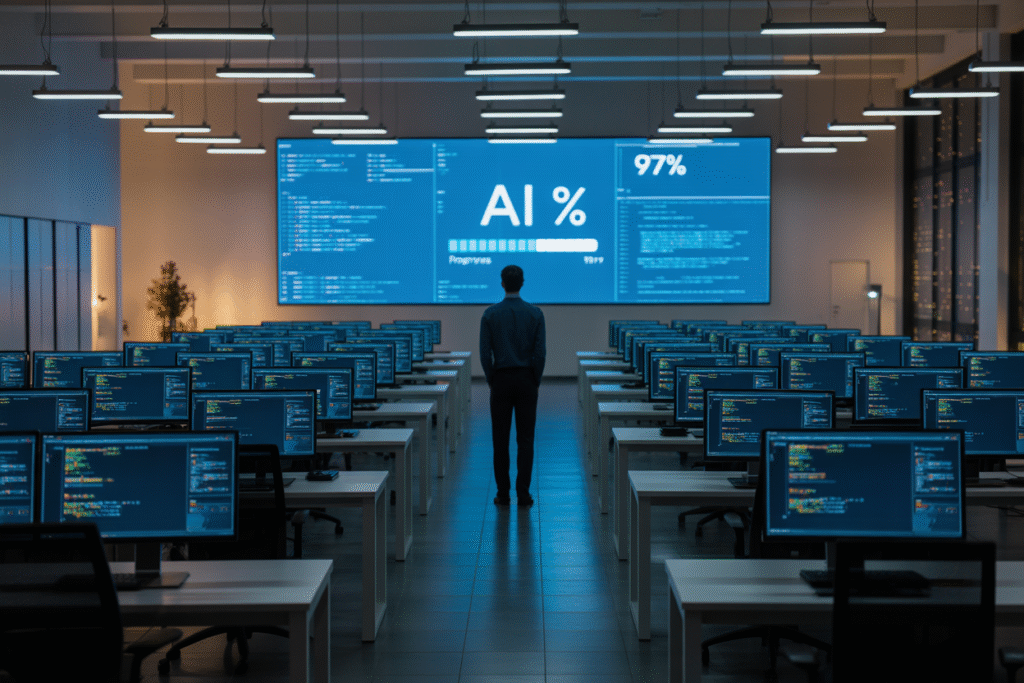AI isn’t coming for your job—it’s already updating its résumé. Here’s how to read the warning signs and fight back.
AI headlines used to feel like sci-fi trailers—distant, dramatic, and easy to ignore. Not anymore. From boardrooms to break rooms, the conversation has shifted from “Will robots take our jobs?” to “How fast?” In the last 72 hours alone, three viral posts by ex-Google execs and policy thinkers have lit up social media with warnings, rebuttals, and battle plans. If you’ve been waiting for a sign to pay attention, this is it.
The Job Apocalypse Is Already Clocking In
Remember when automation was supposed to give us more beach time? Former Google X exec Mo Gawdat just called that promise “100 percent crap.” In a blunt interview, he warns that AI is hurtling us toward a short-term dystopia where jobs vanish faster than new ones appear. His startup, built with a skeleton crew, already does work that once needed hundreds of humans. From typing pools to corner offices, no role feels safe. The kicker? Gawdat believes artificial general intelligence will outshine us in every task—creative, analytical, even emotional. If society clings to outdated economic models, mass unemployment and social unrest won’t be hypotheticals; they’ll be breaking news. The silver lining, he argues, is that we still have a narrow window to redesign our systems—think resource reallocation, universal basic assets, or bold policy shifts—before the algorithms lock in a new, harsher normal.
Fear Spreads Faster Than Pink Slips
Scrolling through X feels like eavesdropping on tomorrow’s history books. Tech thinker Jasmine Sun distilled 42 notes into a single thread that reads like a suspense novel. She argues we don’t need actual layoffs to trigger panic—just the rumor mill. Recent Hollywood strikes, she points out, were fueled less by immediate job losses and more by the fear of what’s coming. Sun also peels back another layer: AI backlash often disguises economic anxiety as moral outrage. Activists rail against “biased algorithms,” but beneath the rhetoric is a deeper dread of mortgage payments and grocery bills. Meanwhile, AI labs keep shipping tools that automate entire workflows, promising efficiency while sidestepping the human fallout. The thread ends with a provocative vision: humans as teachers to machines, transferring context, values, and creativity. Yet even that rosy picture comes with caveats—diffusion lags, edge cases, and the messy reality of retraining millions. The takeaway? Fear is contagious, and narratives shape policy faster than data does.
Who Gets to Program Tomorrow’s Morality?
If one company controls the world’s most powerful AI, whose worldview gets hard-coded into the future? Rovita Lotus Khan sounded that alarm on X, warning that centralized AI governance could shrink global discourse into a single ideological echo chamber. Picture a search engine that gently nudges every query toward one political flavor, or a health app that recommends treatments based on a sponsor’s bottom line. Khan’s post isn’t just dystopian fan fiction; regulators in Brussels, Washington, and Beijing are actively debating who gets the keys to the algorithmic kingdom. She advocates for diverse oversight committees—think global, multi-disciplinary, and transparent—to audit training data, model outputs, and deployment policies. The stakes? Nothing less than the pluralism of human thought. If we outsource moral arbitration to a handful of coders and executives, we risk automating bias at planetary scale. The conversation is urgent because the infrastructure is being poured today—in server farms, lobbying budgets, and legislative drafts—while most citizens are still asking, “What’s an LLM?”


